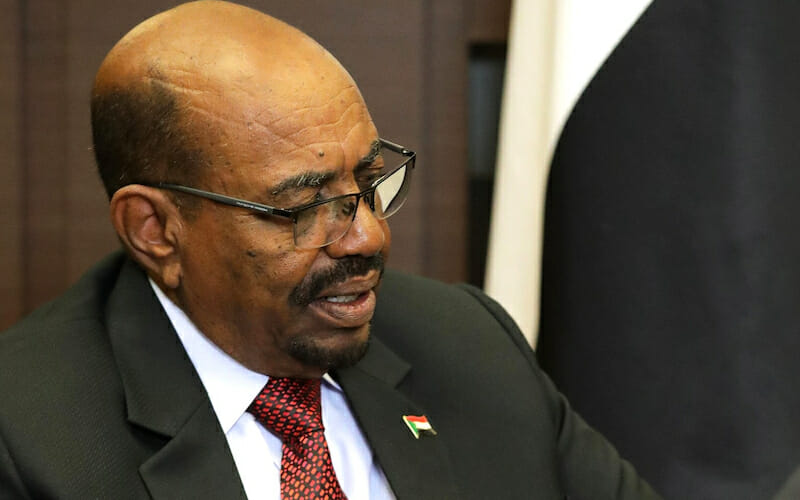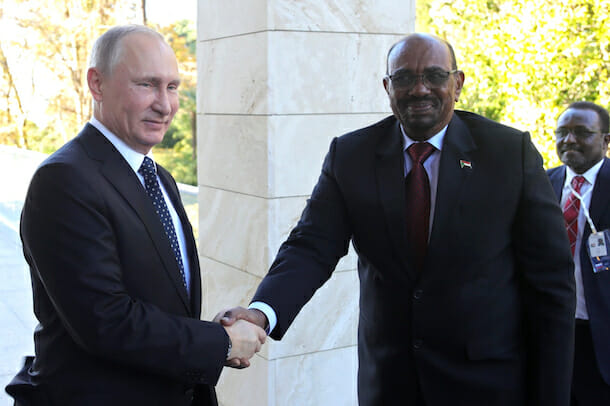
Russia and Sudan are Cozying Up
In November 2017, President Omar al-Bashir of Sudan travelled to Russia, his first trip to Moscow since he came to power in 1989. It was just weeks after the US lifted its long-time embargo against Khartoum and months after the sudden death of the Russian ambassador to Sudan Mirgayas Shirinsky. During the Bashir-Putin meeting, Bashir expressed his opposition to the US policy towards the Middle East in an attempt to secure Russia’s confidence in Bashir and his government. Bashir also announced that Khartoum and Moscow’s interests ‘coincide.’ The main purpose of Bashir’s visit was to ask Putin for protection and to present Sudan as the main gateway for Russia in Africa.
Putin not only invited Bashir, but also sent a plane to Khartoum in order to ensure Bashir’s safety. The International Criminal Court (ICC) had issued a warrant against Bashir for crimes against humanity, genocide and war crimes committed in Darfur. Three out of the four internationally recognized crimes. Both Russia and Sudan are not signatories to the Rome Statute that establishes the ICC.
While the US lifted its embargo against Sudan, the protection Bashir asked for from Putin was a surprise. Many wondered who Bashir feared? Analysts argued that the protection he requested from Putin was an attempt to stay in office after 29 years in power. Bashir insisted that he would not run after his current term ends. Reports suggest that there is a division in the ruling party about Bashir’s successor; some members are suggesting changing the constitution in order to allow Bashir to run again while others are proposing a successor. Bashir’s term ends in 2020.
After Putin won his fourth term in office last week, Bashir became one of the first African leaders to congratulate Putin for his re-election. During the phone call, Bashir not only congratulated Putin, but also invited him to travel to Khartoum in order to deepen the partnership between Moscow and Khartoum. Weeks before the phone call, the Sudanese news agency reported that Sudan is signing a roadmap with Russia to build a nuclear power station in Sudan.
For decades, there were economic, political and military relations between Khartoum and Moscow. Russia as a permanent member of the UN Security Council, along with China opposed initiatives to send peacekeeping missions to Darfur, although the Sudanese accepted the peacekeeping mission through the Comprehensive Peace Agreement in 2005. The Russian veto of the peacekeeping mission was the main reason Bashir embraced Russia’s position and its efforts to ‘defend Sudan’ in the UN Security Council, during his meeting with Putin in November last year.

In addition, Russia is a major arms supplier to Sudan, according to the SIPRI report in 2008. After the Putin-Bashir meeting in Sochi, senior military officials from Russia, Qatar and Sudan held a trilateral military discussion in Khartoum in December to discuss cooperation. This military dialogue came while the GCC crisis is still ongoing and Sudan decided not to take sides in the conflict. Sudan and Qatar agreed to deepen their military relations since the conflict erupted in June 2017. Saudi Arabia and the UAE both pressured the US to lift sanctions against Sudan through lobbying in both the Obama and Trump administrations, due to Sudan’s decision to cut ties with Iran.
Militarization in the Horn of Africa
The Horn of Africa is facing a new era of militarization, due to its strategic importance. Djibouti hosts a dozen military bases by a number of countries, including the US (which set up its largest base in Africa), Japan, a number of European countries and China, its first base abroad.
However, since the Yemen war erupted in 2015, Middle Eastern countries took a more assertive approach to the region’s security and began a competition to set up military bases in the Horn of Africa. Turkey constructed a military base in Somalia and secured a deal to establish a base on Suakin Island in Sudan. The United Arab Emirates installed a military base in Eritrea and also secured a deal with Somaliland. Saudi Arabia also secured a deal to establish a base in Djibouti.
During Bashir’s trip to Russia, he also met with the Russian Defence Minister Sergey Shoigu. Reports suggested that Bashir invited Russia to establish a military base in Sudan. Officials from Khartoum including President Bashir himself confirmed that invitation. While the Kremlin did not comment about Bashir’s offer, a senior member of the Russian Federation Council said that there is no reason for Moscow to reject this offer. However, Moscow expressed a desire to enhance and develop military and defence ties with Khartoum.
Khartoum’s invitation to Russia can be interpreted in different ways. First: Bashir wants protection by Russia as he believes that since Russia defended Sudan in the UNSC in the past, Russia can become a reliable ally of Khartoum. Russia supports Bashar Al Assad in Syria staying in power and since 2015; the Syrian government has had direct military support from Moscow.
Second, as tensions are rising between Sudan and Egypt, Bashir may think that a Russian base in Sudan’s territory can become a ‘bargaining chip’ for Sudan with its relations to Egypt, as Yury Barmin argued. Moscow has strategic cooperation with both Cairo and Khartoum and “may manage to mediate the two countries” said Andrew Korybko. Russian policy towards the Middle East under Putin seeks a balance that would maximize its gain without losing the confidence of any party, as Dmitri Trenin stated in his book What is Russia Up to in the Middle East?
Thirdly, if Moscow decides to establish a military base in Khartoum, the geopolitical significance of that will be in Russia’s favor as it can act as a potential balance among the rival powers in the Horn of Africa. Although the Soviet Union had a military base in Berbera, Somaliland during the Cold War, Putin’s decision to establish a base in Sudan would be the first Russian base in the Red Sea area since the end of the Cold War.

